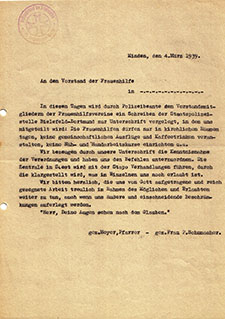Women’s Aid Society: Conformity and Self-assertion
The state’s measures against denominational associations and institutions (“de-confessionalization”) also severely restricted women’s’ aid work, as some examples from East Westphalia illustrate:
According to the information of a police directive of February 13, 1939, the Protestant Women’s Aid Societies in the Government District of Minden were only allowed to hold events as purely church associations only in purely religious settings and in church-owned buildings. The administrative president of Westphalia confirmed these directives from the state police on March 21 and on May 2, 1939. The Women’s Aid Societies’ secular events, such as excursions, coffee circles, knitting and sewing evenings, etc., were strictly prohibited.
Friedrich Meyer, the pastor in charge, and Johanna Schumacher, the president of the Federation of Women’s Aid Societies in Minden, issued a letter informing the individual groups about the new directives. The presidents of the Women’s Aid acknowledged the instructions but did not undersign. Directives of this kind had been introduced successively since 1935. The Westphalian Consistory had already pointed out in early 1937 that the ban on coffee circles was tantamount to a ban on all Women’s Aid events.
The social coffee circle was actually forbidden at the District Federation Celebration of the Minden Women’s Aid Societies in 1939. According to the SD situation report of December 20, 1939, this did not however mean that the Women’s Aid Societies entirely refrained from events with coffee and cake. They held them in secular locations instead.
Source / title
- © Haus der Kirche Minden, Aktenbest. Frauenhilfe Schriftwechsel 1928–1939

